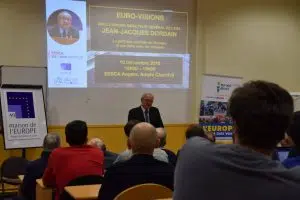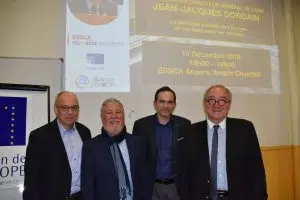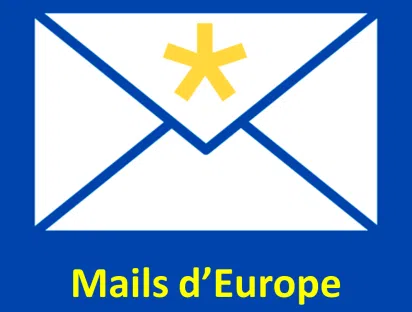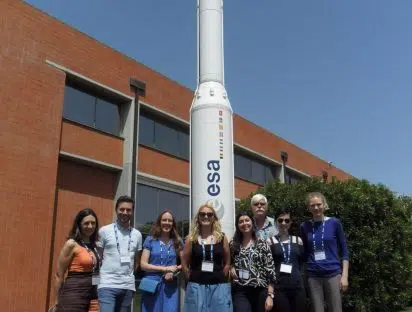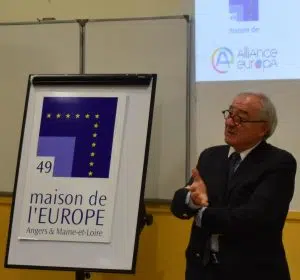 Angers, 10th of December 2018 – Space is entering in a new era with new players such as SpaceX and Blue Horizon in the US and countries like China and India joining the established nations in space. In exiting times like these, the EU*Asia Institute, Maison de l’Europe (49) and Alliance Europa were honoured to welcome Jean-Jacques DORDAIN, the former General Director of the European Space Agency (ESA), in order to discuss European Space Policy and its links with citizens.
Angers, 10th of December 2018 – Space is entering in a new era with new players such as SpaceX and Blue Horizon in the US and countries like China and India joining the established nations in space. In exiting times like these, the EU*Asia Institute, Maison de l’Europe (49) and Alliance Europa were honoured to welcome Jean-Jacques DORDAIN, the former General Director of the European Space Agency (ESA), in order to discuss European Space Policy and its links with citizens.
Here are the 5 takeaways from the event:
1. Common characteristics of Space and Europe Technologies for space were developed on the basis of rockets first used during the second world war. The European Union was founded on the basis to avoid future wars. Hence, both are the children of war. Furthermore, Space and Europe are highly complex projects, not only on technological but as well on organisational questions such as how to cooperate on an inter-state level. Not cooperating is always easier, nevertheless cooperation is the condition for progress, both for Europe and for Space. And finally, the two projects are usually invisible for citizens. Space is difficult to understand for citizens and so is Europe. Often these projects are considered as being reserved for elites. Politicians and bureaucrats dominate the EU, whereas Space topics seem to be the domain of engineers.
2. Cooperation is Europe’s trademark Europe is a big experiment to test what cooperation among nations can achieve. This is why, Europe is perceived all over the world as a blueprint for peaceful and successful cooperation. Consequently, European Space is as well built on this unique European competence of cooperation. Therefore, Europe’s contribution to Space is not only technological but organisational, too, by giving an example of successful cooperation.
3. Resistance is good Mr. Dordain emphasized the fact that not only in mechanics but also in international organisations resistance is good. He explained that “no resistance means that there is no movement” and without movement there cannot be progress. Consequently, it is good when Europeans discuss intensely with each other, because this indicates that progress can be expected at the end of this process.
4. Space influences our everyday lives In the age of data, space technology influences our everyday lives. Satellites gather information about the earth and allow us to make more precise weather forecasts. Moreover, with smartphones and cars almost everyone uses geo-location services such as GPS (USA) or Galileo (EU). Last but not least, space technologies connect people all around the globe, since it is possible to send data to space and redistribute them all over the globe.
5. Space Mining and Space Tourism Asked about the future of space, Mr. Dordain explained that space mining and space resources will become increasingly important in the future. All minerals that can be found on the earth are present in space, too. Using space resources will allow humans to go further in space. The former head of ESA concluded with expressing the hope that one day spaceships will be as common as airplanes and that space tourism will allow people to discover the earth from a different perspective.
The EU*Asia Institute thanks Mr. Dordain for the truly inspiring speech and fruitful discussion. We are looking forward to the upcoming Euro-Visions events in 2019. Euro-Visions is an event series of the EU*Asia Institute, Maision de l’Europe (49) and Alliance Europa. Follow us on Facebook, Twitter and on our Website to stay informed! 